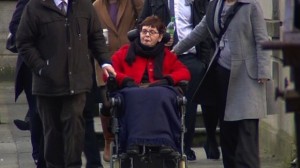Legislation can be designed to allow the partner of a terminally ill woman to assist her suicide, the Irish Supreme Court has heard.Image may be NSFW.
Clik here to view.
A lawyer for Marie Fleming, 59, who is originally from Lifford, said she was being adversely affected to create a benchmark to prevent others breaking the law.
The former lecturer was diagnosed with multiple sclerosis in 1986.
Last month she failed to establish her partner’s legal right to help her die.
Three judges at the High Court in Dublin ruled in January they could not support allowing a third party to bring about the death of another.
Suicide was decriminalised in Ireland in 1993. But the ban on assisting another person to commit suicide remains in force and a jail sentence of up to 14 years may be imposed for that offence.
Ms Fleming, who has two adult children, is cared for by her partner, Tom Curran.
The court has previously heard that Ms Fleming, who is not attending the three-day hearing, is confined to a wheelchair, physically helpless, lives in constant pain, cannot swallow and suffers choking sessions which wear her out.
She wants to be allowed die peacefully with dignity at home, when she chooses, in the arms of her long-term partner, Tom Curran, without him facing the threat of jail.
The BBC reports that Brian Murray, senior counsel, told seven judges hearing the appeal in Dublin on Wednesday that his client was being denied what she seeks for fear that without an absolute ban on assisted suicide there could be more relaxed practices by doctors.
“It is our position that it is possible to design legislation that facilitates the plaintiff in a way that does not present any risk to the involuntary death of others,” he said.
Mr Murray said it may be legitimate government policy to discourage people from choosing death over life, but he argued it was not a proper basis for telling people what decision they can make about their lives.
Without proof of actual risk to others there was insufficient justification for impairing the constitutional rights of Ms Fleming, he said.
He maintained there are concerns to avoid circumstances in which persons who are not acting of their own free will, or are not competent, are induced to do something they would not otherwise do.
But there were people who should be entitled to give reality to their decision and execute their decision, he argued.
“The fact that other people might break the law and cause involuntarily deaths is not in itself good constitutional justification,” Mr Murray said.
Ms Fleming is challenging the constitutionality of the Criminal Law Suicide Act 1993, alleging it discriminates between able-bodied and disabled people.
In December, Ms Fleming told a three judge division of the High Court court the ban on assisted suicide was forcing her to live against her will in a life of pain and indignity.
The former lecturer is almost completely physically incapable and would need help to take her own life.
The appeal was fast-tracked through the legal system after the ruling in the High Court last month.
Although the High Court judges agreed a competent adult had the right to refuse medical treatment even if it led to death, they ruled the taking of active steps by a third party to bring about the death of another was entirely a different matter.
They said if the court could tailor-make a solution that would affect Ms Fleming only without implications for third parties there might be a good deal to be said for her case. But the court ruled it could not be so satisfied.